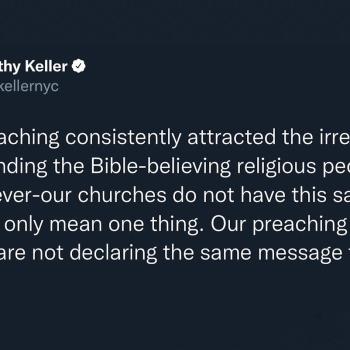Contrary to what some would suggest, it is the duty of any man in a position of influence or power to anchor their authority to the Bible – especially those whom He has called as shepherds. It is no controversy that the Lord establishes and deposes kings (Dan. 2:21). Christ Himself corrected Pilate, demonstrating that the very man having the “power” to either free Him or crucify Him, only received his “power” from above (Jn. 19:11).
In addition to this, Paul clearly lays out the proposition that there is no authority except that which God has established (Rom. 13:1). Indeed, it is for this very reason Paul informs us that those who rebel against a governing authority are in opposition to God Himself, and will rightly suffer the consequences of their actions when the one who wields the sword executes justice.
Furthermore, we know that those who hold “general” offices of authority are in dereliction of their duties when they abuse this authority. All in a position of authority are to submit themselves to God, yet often one finds there to be a plethora of examples in history where this simply isn’t the case. Even in the biblical witness, we see Paul establish that the general function of these governing authorities are to be a protection for those who do good (Rom. 13:3-4).
When governing authorities become a terror for the righteous, there is biblical warrant for civil disobedience (Acts 4:19, 5:28; Dan. 3:16-18, 6:7-10; Ex. 1:16-20). In any of the cases listed above, the biblical writers assume a necessary knowledge of the offending party. Even more clearly, Romans 1:18-19 leaves all men without excuse, since God has put a knowledge of Himself in every person – yet they suppress the truth in unrighteousness. Thus they not only are aware of the One True God, but they are aware of His stipulations upon them for exercising their authority rightly. In this, the optimal standard of developing a just legal system would be derived from Scripture.
The point in this excurses is to simply demonstrate that even in the civil realm, governing authorities are subject to act in accordance to God’s standard, as revealed in the Bible. Lest we think the mandate belongs to only those in civil authorities, we find the same precise reasoning offered to any in position of authority within the social sphere (Eph. 5:21-6:9). Like civil authorities, social authorities are charged to act in accordance with God’s standards prescribed in Scripture.
How much more so then is the one given authority over God’s people as the under-shepherd (Tit. 2:15; 1 Thess. 5:12; 1 Tim. 5:17)? How much more so the one to whom souls are entrusted to (Heb. 13:17)? How much more so the one charged to guard the doctrine of the church (Tit. 1:9), or the one who is to entrust that same doctrine to faithful men who will in turn teach others (2 Tim. 2:2)?
One might be able to argue that causally, without the resurrection of Christ there would be no church, and therefore, no New Testament to anchor one’s teaching to. This is, of course, very true. Without the resurrection, the entirety of the Christian faith would be demonstrably untrue and useless. Without the resurrection, we of all men would be the most to be pitied (1 Cor. 15:9).
However, this presents the false dichotomy that one must choose between “Thus saith the Lord” and the resurrection of Christ if they are to be strengthened in the faith. Rather, we only know of the resurrection through the account of the Scriptures. Without a verifiable, written record, one might have an oral tradition, yet there is no possible way to trace the accuracy of an oral tradition. Regardless of this, it is incontrovertible that we have been handed a compilation of 66 inspired books, with words, sentences, paragraphs, all jam-packed with meaning and significance for the child of God.
Vicariously, modern Christians only know of how we might rightly live before our Creator in every aspect, because of the Scriptures. Without this record preserved, we would be utterly devoid of any record, and without a knowledge of salvation and the proper response of walking in the truth. The Scriptures don’t isolate the resurrection of Christ from the remainder of the teaching found in Scripture. Rather, it is presented as the linchpin of our Christian life. If the resurrection didn’t happen and the dead are not raised, Paul simply says, why not eat and drink – for tomorrow we die (1 Cor. 15:32).
I might also point out that Luke saw fit to record these truths as an investigated, accurate, orderly account of the things that were fulfilled among them. What this explicitly refers to, of course, are the works and nature of Christ, pre and post resurrection, and they were then given to his “most excellent Theophilus, so that you may know the certainty of the things you have been taught” (Lk. 1:1-4, emphasis mine). It is rather interesting to note that it is through a written account that Theophilus would know the certainty of the things he had been taught. Undoubtedly, this would include the miraculous phenomena of the resurrection of Christ, yet as any reader of Luke’s gospel and the book of Acts well-knows, it isn’t limited to this.
Now, take a man like Andy Stanley, who has repeatedly caught heat due the manner with which he downplays the authority and pertinence of Scripture. Andy builds his premise by highlighting the resurrection as the sole thing which Christians anchor the authority of their teaching to. His reason being: anchoring one’s authority and teaching to the Bible (and not the resurrection) has the potential to weaken rather than establish faith. Not only is this incredibly misguided, as was shown above, but it is just flat out wrong because genuine Christians will love the Word of God.
Put more bluntly – you can’t be a Christian and despise the Bible; you can’t be a Christian and “nothing” the Bible. If you don’t love the truth of God you are not within the household of God. It truly is that simple. If you can read the entirety of Psalm 119 and walk away with the idea that one who loves God can bifurcate between this love of God and His Word, I recognize the battle has long been lost in contending for this concept with you.
However, I would still resoundingly say this very same Psalm transmits the idea that without God’s word, we will actually become weakened, unholy, and without hope. In other words, I’m arguing precisely the opposite of a gent like Andy Stanley, in that all Scripture is useful for the modern Christian. This is the same reason I might “pick on” a man like Steven Furtick as well, for in the end, both men (and others like them) leave little to be desired in their teaching. They don’t handle the deep truths of the Bible, arranging the feast before their parishioners to eat and drink of a food which nourishes the soul.
The reasons for this are simple, as they either don’t believe people to be able to dwell upon the deep things of God, or, they aren’t all that interested in it themselves because they sense it isn’t relevant, edifying, might cause some to stumble, etc. They argue it will produce weak believers, knowing full-well that you can have an individual who knows the Bible in and out and contains no love for God – yet you cannot have an individual who genuinely loves God and doesn’t know the Bible.
God gave us words to preserve His revelation. He could have given us another means – yet God saw fit to give us words on a page. He didn’t give us videos; He didn’t give us a preserved oral tradition. He gave us words in a book. Through these beautiful means He gave us the truth of vital teachings like the resurrection – yet He also gave us every single thing we need this side of heaven for life and godliness, and every other teaching vital to Christianity.
In an age where nearly every denomination makes concessions upon the truth – where the institution of the family is slaughtered, impaled, and paraded through a pride rally where men gyrate on little boys (and somehow this isn’t sexually aggressive, pedophiliac behavior); we need men who will be faithful to uphold the idea that this book is the only thing we’ve got – and that it is an immeasurable kindness from the Lord. We need men who are willing to stand and declare sin, sin. Not simply a “brokenness” – sin. We need men who are willing to lose the invitations to popular speaking gigs as they stand against social issues opposed to Scripture. We need the men who are willing to rally behind a book that has caused more upheaval in the history of mankind than any other, and not shy away from the fact that will make them abundantly less popular amongst the goats.
We need men who are content being labeled a fool simply for taking God at His Word. We don’t need any more weak preachers who continue to downplay the significance of large swaths of holy writ. We don’t need more men without conviction who don’t want to challenge anyone to know God – to really know God. We need men willing to make parishioners uncomfortable in their seats when they are in disobedience to Scripture, whether in action or ideology. We need men who will faithfully stand in the pulpit and proclaim the whole counsel of God and let the chips fall where they may. We need men who earnestly believe the Bible is all they have – and that it’s more than enough.
Either we will be convinced that this book truly means what it means, or we will bow the knee to whatever wind of doctrine comes along. If the former is not the case for you, I beg you: get out of the pulpit. If you can’t or won’t feed and shepherd His sheep, get out of the way.













